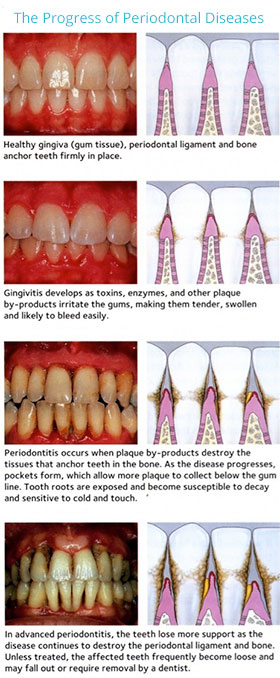 What causes periodontal disease? Healthy gum tissue fits tightly around a tooth like a shirt cuff fits around your wrist. When someone has periodontal disease (also called gum disease), the gum tissue pulls away from the tooth. Periodontal disease is inflammation of the gums. It is a common disease that affects people of all ages. There are many types of periodontal diseases. If not treated, the disease progresses and the tissue and bone that support the tooth are destroyed. Over time, teeth may fall out or need to be removed. Periodontal diseases are caused by plaque, a sticky film that is always forming on your teeth. Plaque gives a home to bacteria that produce harmful toxins. If teeth are not cleaned well, the toxins can irritate and inflame the gums. Inflamed gum tissues can pull away from the teeth and form spaces called pockets. The pockets provide a home for more bacteria. If the infected pockets are not treated, the disease can get worse. The bone and other tissues that support teeth are permanently damaged. Plaque can be removed if you brush and clean between your teeth every day. But even if you brush and floss daily, you may not remove all the plaque, especially around the gum line. Plaque can harden into a rough surface called tartar. The only way to remove tartar is with a professional dental cleaning.
What causes periodontal disease? Healthy gum tissue fits tightly around a tooth like a shirt cuff fits around your wrist. When someone has periodontal disease (also called gum disease), the gum tissue pulls away from the tooth. Periodontal disease is inflammation of the gums. It is a common disease that affects people of all ages. There are many types of periodontal diseases. If not treated, the disease progresses and the tissue and bone that support the tooth are destroyed. Over time, teeth may fall out or need to be removed. Periodontal diseases are caused by plaque, a sticky film that is always forming on your teeth. Plaque gives a home to bacteria that produce harmful toxins. If teeth are not cleaned well, the toxins can irritate and inflame the gums. Inflamed gum tissues can pull away from the teeth and form spaces called pockets. The pockets provide a home for more bacteria. If the infected pockets are not treated, the disease can get worse. The bone and other tissues that support teeth are permanently damaged. Plaque can be removed if you brush and clean between your teeth every day. But even if you brush and floss daily, you may not remove all the plaque, especially around the gum line. Plaque can harden into a rough surface called tartar. The only way to remove tartar is with a professional dental cleaning.
The health of your mouth is linked to your whole-body health. Research suggests that periodontal diseases may be related to other health problems, such as diabetes and heart disease. Researchers are trying to find out just how periodontal bacteria are related to overall health.
It is possible to have periodontal disease without pain or other obvious symptoms. That’s why it is important to visit the dentist regularly. Regular dental visits allow your dentist and hygienist to treat problems in early stages. During a dental checkup, the dentist or hygienist will perform a periodontal examination. If you are diagnosed with periodontal disease, it is commonly categorized as one of the following.
Gingivitis is the mildest form of periodontal disease. Gums may be red, swollen and may bleed easily when you brush. The good news is that this early stage of periodontal disease can be reversed. Sometimes all it takes is better at-home dental care and regularly scheduled professional cleanings to improve the health of your gums.
Periodontitis is an inflammatory disease that affects the tissues around the tooth and the bone that supports the teeth. If left untreated it can lead to loosening of teeth and tooth loss. Periodontitis is classified based on severity of the disease, mild to severe.
The teeth lose more support as the gums, bone, and periodontal ligaments continue to be destroyed. Unless treated, the affected teeth will likely be lost. Generalized moderate to severe bone loss may also be present.
At Virginia Family Dental, your dentist and dental hygienist will evaluate you for periodontal disease and recommend the appropriate treatment. If the disease is caught in the early stages of gingivitis, and no other damage has been done, one to two regular cleanings will be recommended. You will also be given instructions on improving your daily oral hygiene habits and encouraged to schedule regular dental cleanings.
If the disease has progressed to more advanced stages, a special cleaning called periodontal therapy will be recommended. In this treatment the plaque and tartar are carefully removed down to the bottom of each periodontal pocket. This treatment may be done over several visits, depending on your needs. This procedure helps gum tissue to heal and pockets to shrink. Medications, special medicated mouth rinses, and a power toothbrush may be recommended to help control infection and aid in healing.
Good oral hygiene practices and regularly scheduled dental cleanings are essential in maintaining dental health and keeping periodontal disease under control. If you would like more information about gum disease therapy procedures and treatments we offer at Virginia Family Dental, give us a call today at (218) 741-0405 to schedule a consultation with one of our dentists.
Monday 8:00 AM – 5:00 PM
Tuesday 8:00 AM – 5:00 PM
Wednesday 8:00 AM – 5:00 PM
Thursday 8:00 AM – 5:00 PM
Friday Closed
For after hours care, call: (218) 741-0405